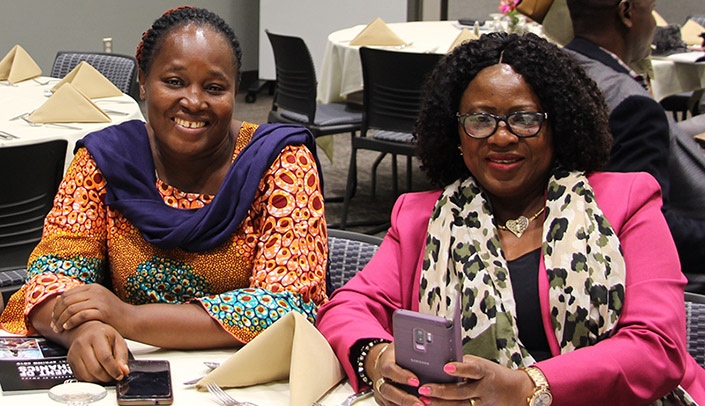In late September, faculty and researchers from UNMC, the University of Nebraska at Omaha and the University of Nebraska-Lincoln took part as International Programs at UNO hosted a group of academic leaders from Nigeria for the conference, “Advancing the Frontiers of Public Tertiary Education in the 21st Century.”
Participants from Nigeria came from Federal Polytechnic of Auchi, Federal Polytechnic of Idah, Federal Polytechnic of Ado-Ekiti, OSUN State College of Education in Ileshi, and the Institute of Management and Technology in Enugu. The team consisted of college faculty with diverse expertise and ethnic backgrounds from Nigeria, which has more than 300 ethnic groups.
The event featured faculty and researchers who specialize on projects in public health, agriculture, biomechanics and administrative strategic planning and leadership. The conference highlighted the value of community engagement and how public universities enhance training and civic understanding by having students engage with and serve local communities through course projects and research.
“The participants in this conference represented a wide range of disciplines,” said Jane Meza, Ph.D., associate vice chancellor for global engagement at UNMC and UNO. “We wanted to include UNMC researchers — such as Stephen Obaro, M.D., Ph.D., who discussed the important work that he is doing in Nigeria to understand the epidemiology of bacteraemia syndromes in children and the risk factors associated with these infections. Our visitors also toured iEXCEL to learn about this transformative model for health care education, training and research.”
Dr. Obaro said it was interesting to learn of the visitors’ different views on some of the major challenges with graduate education in Nigeria.
“They were all eager to learn about the American educational system and identify areas that can be meaningfully adapted to the system in Nigeria,” he said. “Engaging with them provided opportunities to reflect on the wealth of resources available to us at the University of Nebraska and how we can, with very little effort, make a huge impact by establishing targeted collaborations that will be mutually beneficial and increase the global visibility of our institution.”
UNO’s Olu Oyinlade, Ph.D., professor of sociology and a native Nigerian, served as lead facilitator for the week’s meetings.
“I would say this conference, at the very least, has exposed [our guests] to the ways that things can be different from the way things are back in Nigeria,” Dr. Oyinlade said. “I think all of this they are going to take with them, so that when they go home they can begin to make changes. I’m hoping by traveling through the community that will also get them some ideas of what could be different back home.”
Through dialogue about the challenges of higher education and changing needs in industry and educational preparation, participants explored creative ways to lead education for the future and to strengthen international ties with Nebraska.
“It was a pleasure interacting with this group of Nigerian education leaders, sharing ideas and tips on leadership and exploring differences between the U.S. and Nigerian educational systems,” said Dele Davies, M.D., senior chancellor for academic affairs at UNMC. “The participants were highly engaged and there was a rich dialogue that bodes well for enhanced collaborations between the Nigerian institutions and both UNMC and UNO.”
